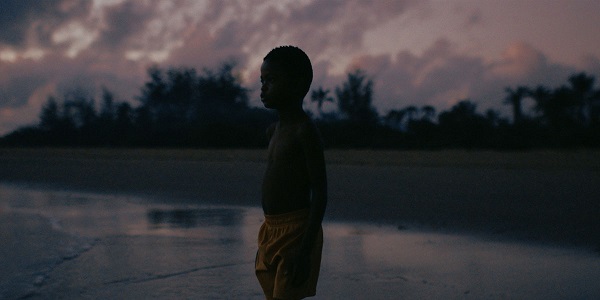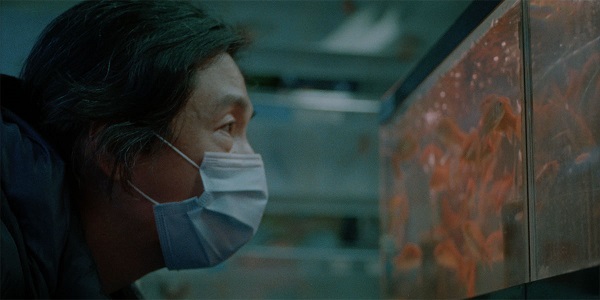
Family and friends are great to have but there are somethings that make characters or film subjects feel alone, despite whether or not there are people physically around someone. That’s the feeling I get in the second Short Cuts Programme, which has resilience as a theme. Come to think of it, resilience and solitude can go hand in hand. Let’s begin.
Adults feel like children in A la vie a l’amour, which isn’t necessarily a bad thing. Here, Cesar (Lex Garcia) deals with the consequences of a breakup by visiting family and friends. He asks them what unconditional love is. I wrote the first sentence in this paragraph because the people he talks to don’t necessarily have anything insightful to say. This, again, isn’t a bad thing because love is ephemeral. Strange thing about this film too is that even if Cesar doesn’t find any answers, the short makes its viewers feel that love through its aesthetic. The short’s director, Emilie Mannering, is a white woman. Yet she captures Quebec’s Black citizens and you can feel how the actors trust her. This short show good things and bad things happening in one day. It can remind us of any day in our lives that feel that nuanced.
Looking into the life of a character can be difficult at times. Mbithi Masya’s Baba can sometimes feel like that, just like many shorts with conceits and revelations. The short shows us the titular six year old Kenyan boy (Malik Wandera) wandering in a beach alone. This cuts to scenes where his family punishes his cousin Kevin for not protecting him. This is opposite of Masya’s previous work Kati Kati. There, characters blurt out the premise outright, but this slower approach has its merits. Wandera has this ability to captivate viewers while behaving or while Baba sees something new. These new experiences show him the fantastical and the cruel nature of the world and the people inhabiting it. Sam Soko serves as an executive producer.
One couple risk breaking up in Hazel Mckibbin’s She Always Wins. And that slight tension in their relationship has a cause that, when we came to think of it, is how many relationships may end. This reason, by the way, is when one person in that relationship, Stella (Honor Swinton Byrne) invites her boyfriend to a vacation home. And she clears an outdoor breakfast table to teach him backgammon.
It’s a game my middle class Asian self used to play as a kid but with rules I forget now. The reason I bring up my class and ethnicity into this is because the short makes backgammon seem exclusive. Like it’s only upper class British game. And Stella thinks her boyfriend is a bit of a threat because he accuses her of not properly teaching her. Class and nationality come into play here. I’m not sure if the short plays the coward’s way out but the characters feel like they do, or do they?
Three cars drive through a highway in either direction, a mundane sight that an 8 or 16mm film captures on Municipal Relaxation Module. Its director, Matthew Rankin, uses those visuals and accompanies them with voice messages. These messages come from a man with a perfect idea for a bench, and those series of messages are an emotional journey in the best of ways. There’s also something refreshing about these messages. That’s because from the kind of character whose dreams haven’t died yet, or about to. Maybe those dreams resurrect, and maybe viewers should be more like him and pitch away. A great comedy about individualism’s flaws and perks, playing out in Winnipeg’s highways. Also a great commentary on how whether people think they’re in the right job or not. The best short in this programme so far.
Wants feel like a luxury in Lloyd Lee Choi’s Same Old, about a Chinese American man doing deliveries in a big city until someone steals his bike. Despite of a crime that sets him back a thousand dollars, he tries to forge on, doing what he can to buy a bike. He tries to borrow from loan sharks, borrow from who seems like an ex, and pawn his ring. It’s one of those situations that make someone do drastic things to get their job, if not quit for the day. The comparisons towards Vittorio De Sica’s The Bicycle Thieves are obvious. Otherwise this belongs to the ‘you have to be there’ kind of cinema, where actions doesn’t lead to consequences. When one experiences the worst day of their lives only to not tell the ones they love, to forget that day. Knowing that there may be another worst day ahead.
Days in lives of characters can be interesting, but I can’t necessarily say the same thing about The Shadow of the Butterflies. The animation here feels like a mix of many aesthetics which kind of work. They range from Islamic and Mongol art to the artists that inspired those styles like Matisse or Brakhage. The story here is of a naked woman in the woods finding herself at one with the butterflies. It feels a bit slight for me to consider it a plot. More shorts can do more with shorter running times, so why can’t this one?
The short film ending this programme is Sarah McCarthy’s Anastasia, which, thankfully gives enough spotlight to the titular participant, activist Anastasia Shevchenko, and her daughter Vlada. Both are mourning Anastasia’s daughter and Vlada’s younger sister Alina who died seconds before Anastasia was able to leave prison to see her. The short has its share of domestic scenes before and after Anastasia, Vlada, and the whole family go on a trip. They ride a train from Rostov-on-Don to Anapa near the Ukriane. There, they can spread Alina’s ashes within the Black Sea. Making this a family portrait is essential is showing how each member feels about Alina and Russia’s current political situation. It feels long and feels ‘important’ but the short eventually garners that latter designation.
- Release Date: 9/9/2022



